50 Years Of Caring
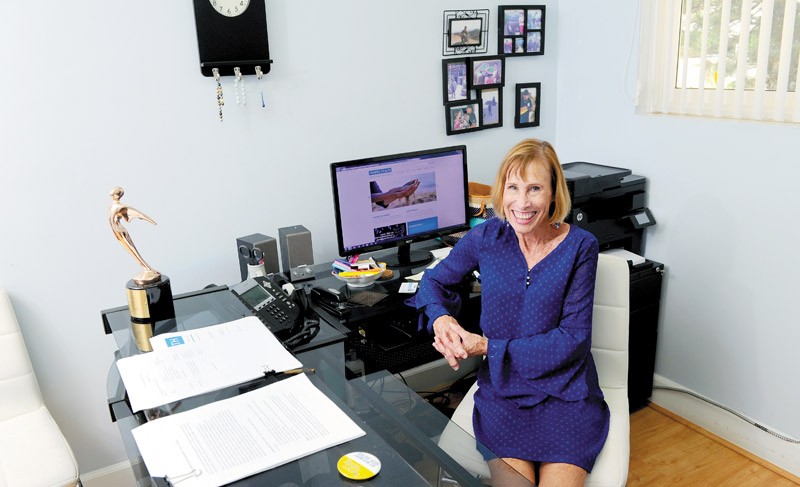
Waikiki Health CEO Sheila Beckham in her office PHOTO BY LAWRENCE TABUDLO
What started off as Waikiki Drug Clinic now is known as Waikiki Health. As the Federally Qualified Health Center, led by CEO Sheila Beckham, celebrates its 50th anniversary, Waikiki Health remains a vital organ of this community
Waikiki Health CEO Sheila Beckham is well aware of the common misconceptions people may have when it comes to the topic of public health. Yes, Federally Qualified Health Centers like Waikiki Health function as a haven of sorts for the underserved and uninsured. Yes, this includes the growing homeless population in Hawaii.
But it also is a place that professors, attorneys, other health care professionals, Beckham herself and one former mayor turn to as well.
“We really have people of all walks of life that choose to come here because of the excellent care,” says Beckham.
“People think sometimes that community health centers — you’re not the smartest, you’re not the most talented, but it’s a choice,” she adds. “We have some amazingly forward-thinking, gifted leadership and provider staff.”
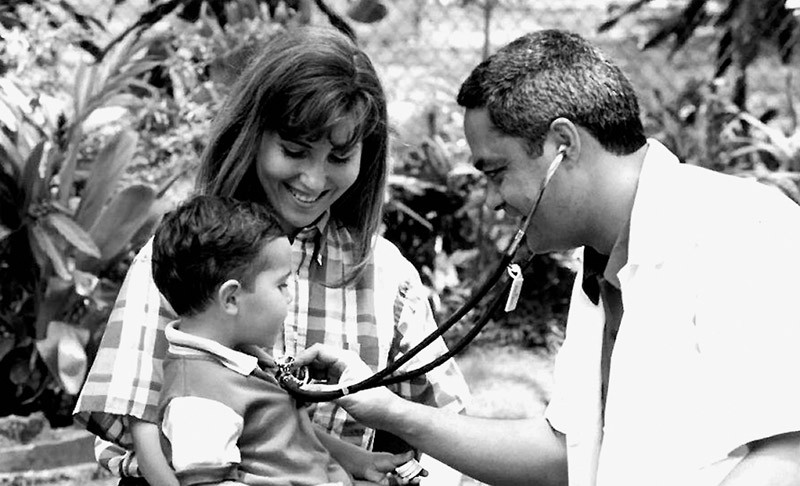
Dr. Elliot Kalauawa (right) has been with Waikiki Health for 30 years. He’s currently chief medical officer
Its reputation within the community has outlived years of evolution as Waikiki Health has grown to encompass multiple locations, services and programs. At a time when it is perhaps needed the most, Waikiki Health continues to thrive.
Later this month, it will celebrate 50 years of caring for the community with a sold-out gala fundraiser, and Beckham couldn’t be more thrilled to have reached this milestone.
“We’re very, very proud,” she says. “To have the diversity that we have in terms of population and services and all the opportunities I believe we’ve entered into — I think it’s just amazing.”
Before it ever was known as Waikiki Health — a name that was announced in 2013 — it was Waikiki Drug Clinic, founded in 1967 by a community concerned with a rising drug problem in the area. Its next name change, to Waikiki Health Center, came in 1977, reflecting a broadening range of services.
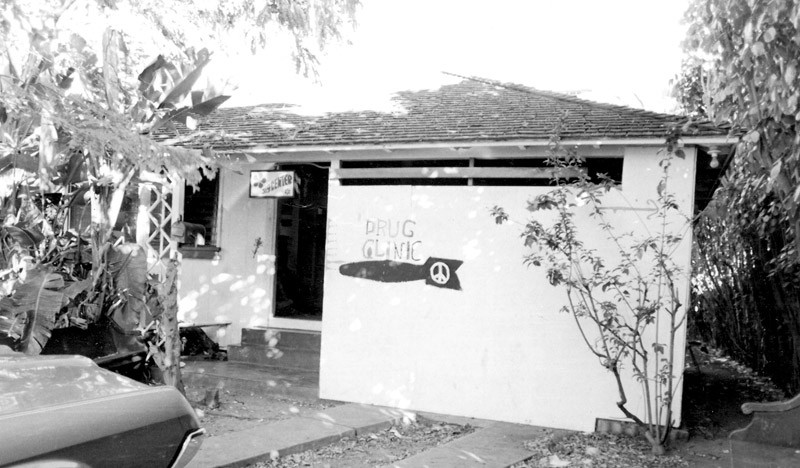
The former Waikiki Drug Clinic location on 319 Paoakalani Ave., owned by Liliuokalani Trust
In the years that followed, it drastically expanded.
In 1987, for example, it launched Care-A-Van. A mobile clinic that still is in existence today, Care-AVan not only provides medical care to the homeless community, but also offers mailbox services, and help with getting state IDs and housing.
“We kind of spread out and tried to reach populations that are not your mainstream, and a lot of people don’t want to work with those populations,” says Beckham.
Along the way, Waikiki Health established Friendly Neighbors, which helps seniors in the Waikiki area with everything from making meals and running errands, to offering simple companionship. Then came YO!, its homeless and at-risk youth outreach program that works in partnership with Hale Kipa; Next Step Shelter, which takes in homeless individuals, and — among many things — provides job training and help into permanent housing; and Perinatal Addiction Treatment of Hawaii (PATH) Clinic that works with expectant mothers who have substance abuse issues.
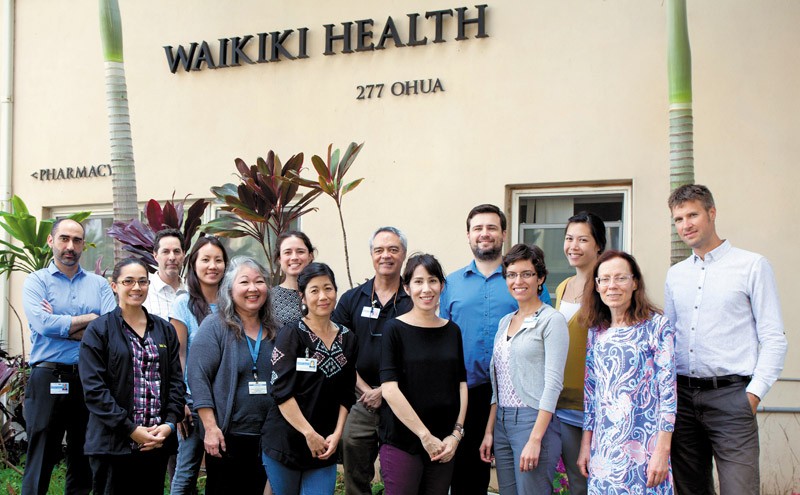
Healthcare providers from Waikiki Health’s five clinic sites: (front, from left) Maile Alcos, Jane Stinson, Ku‘ulei Miura Fahling, Jeanelle Ahuna, Allison Higa-Howerton, Dr. Sara Seabolt, (back) Dr. Ahoora Payam, Dr. Daniel Saltman, Dr. Karen Dang, Shayna Inafuku, Dr. Elliot Kalauawa, Ryan Erlenbach, Chelsey Keola and Dr. Florian Sattelmacher
In addition to all that, Waikiki Health offers assistance with and treatment options for HIV, Hepatitis C, sexually transmitted diseases and smoking. Also included in its extensive list of services are optometry, dentistry, help and advice with nutritional needs, transportation to and from its sites or the hospital, pharmacies, Native Hawaiian healing options, and case managers and coordinators who help with preventative medical care.
Beyond physical ailments, Waikiki Health also addresses
behavioral issues. According to the organization, 1,056 patients each year are monitored for depression and mood disorders.
“We go where the need is,” says Beckham.
One of its bigger initiatives at the moment, however, is renovating and expanding the Harry & Jeanette Weinberg Makahiki Medical & Dental Clinic, which Waikiki Health opened in 2014. Located in the Moiliili/McCully area, its Makahiki clinic offers more room for a growing need of
its services. Once the project is complete, it will include 19 exam rooms and additional offices for administrative departments, along with dental operations and a full-service pharmacy.
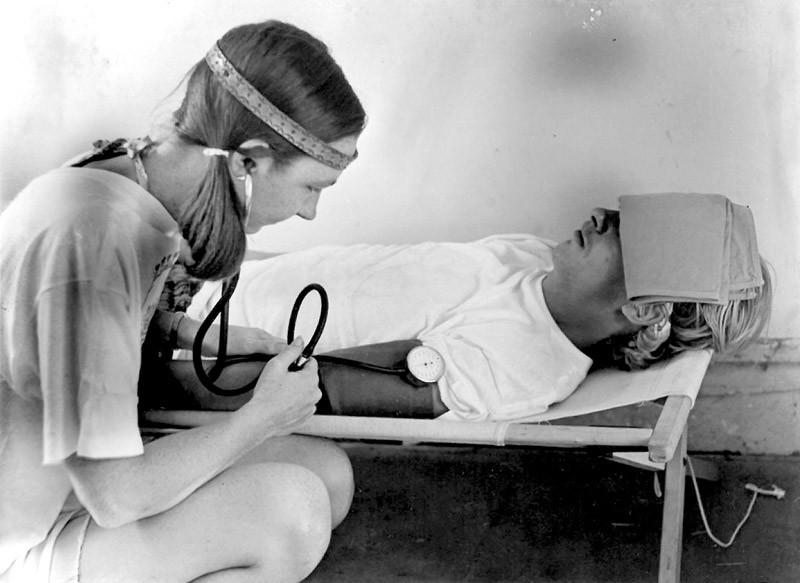
A Waikiki Health provider cares for a patient
But beyond that, it’s almost impossible for Beckham to pinpoint only one program or area of interest Waikiki Health is concentrating on right now.
“We focus on everybody, everything,” she says. “The team comes together and the team is able to help lead us forward, do the best we can for everybody.”
The way Waikiki Health works is rather simple. Because of federal health care guidelines outlined by the U.S. Health Resources and Services Administration, it is not allowed to turn anyone away. It accepts Medicare and Medicaid, and those without any insurance still are welcome to receive services from Waikiki Health with help from a sliding fee scale.
Half of its funding comes from Medicaid, Medicare and other private insurances. The other half comes from grants and donations.
All of that recently came under threat, however, with the introduction of the American Health Care Act. Under those guidelines, Congress would have been tasked with creating block grants for Medicaid — something approximately 52 percent of all Waikiki Health patients rely on, while another 20 percent are uninsured. This, of course, would be unlike the way Medicaid has worked since it was created in 1965, which, according to The New York Times, could be described as “open-ended entitlement.”
While the American Health Care Act ended up getting pulled before a vote was taken, that doesn’t mean the security of U.S. health care is set in stone. Lest anyone forget, a proposed budget cut released last month indicated the Department of Health & Human Services would see a budget decrease of 16.2 percent, according to CNN.
Waikiki Health may have dodged a bullet this time, but that doesn’t mean it still can’t benefit from the continued support of the community. It always is in need of donations, such as hygiene products, clothing, backpacks, slippers, towels and sheets.
Even something as simple as engaging with people in the waiting room of its clinic is welcome, says Beckham, noting that it is not uncommon for patients to arrive first thing in the morning so that they have a place to stay for the day. And, of course, monetary donations of any kind always are welcome.
In the meantime, Beckham is doing what she can to ensure the future of Waikiki Health remains secure. Just last week, she and a team traveled to Washington, D.C., to advocate with constituents from Hawaii and other states.
The importance of having a Federally Qualified Health Center like Waikiki Health in the community right now is rather simple, says Beckham. It gives people who need help a place to go — which also is why funding for it is key.
“It’s a struggle for us if everybody comes here with no insurance,” says Beckham. “But we are mandated to provide the highest quality of care that we can for every single person that walks in that door.”
“I believe that community health centers are very important because many patients are not able to receive care, for various reasons, from the private sector,” adds Waikiki Health chief medical officer Dr. Elliot Kalauawa. “We also often understand their needs better since we have more experience in dealing with their types of problems.”
To learn more about Waikiki Health, and to make a donation or get involved, visit waikikihc.org.






